Serbia is in the midst of one of its most significant political crises in recent history. What began as an outcry over a tragic infrastructure failure in Novi Sad has grown into a mass movement demanding justice, transparency, and the dismantling of the corrupt networks sustaining President Aleksandar Vučić’s government.
The collapse of the Novi Sad train station’s roof canopy on November 1, which killed fifteen people, became a symbol of a deeper systemic rot. The event triggered widespread public outrage, shaking national confidence in the state’s ability to safeguard its citizens. What distinguishes this crisis from previous ones is that it was not the result of foreign aggression, such as the Nazi occupation during World War II or NATO’s 1999 bombing campaign, but rather an internal failure of governance. The Serbian state itself, through corruption and mismanagement, is now perceived as the primary cause of disaster.
Amid growing distrust in public institutions, students have taken center stage in Serbia’s political resistance, leading a wave of protests that have forced high-profile resignations and intensified scrutiny of the government’s ties to corporate and foreign interests.
A Challenge to the State
Since November, Serbia’s universities have become hubs of political resistance. Student organizers, led by over thirty university and faculty groups—most notably Belgrade’s Faculty of Dramatic Arts—have launched sustained protests, articulating four central demands:
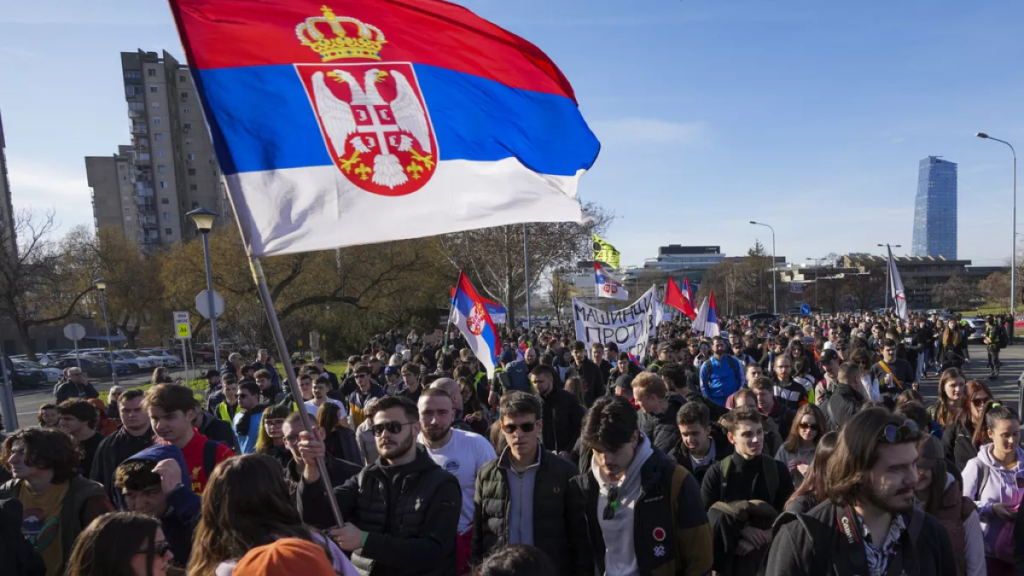
- Transparency in Infrastructure Contracts – Releasing all internal documents related to the Novi Sad railway station’s renovation, involving Serbian Railway Infrastructure, the Serbian government, and Chinese corporations China Railway International and China Communications Construction Company.
- Amnesty for Protesters – Dropping all charges against detained students and young activists arrested during demonstrations.
- Accountability for State Violence – Prosecuting those responsible for attacks on student activists and professors.
- Investment in Public Education – A 20% increase in budget allocations for public universities to improve material conditions.
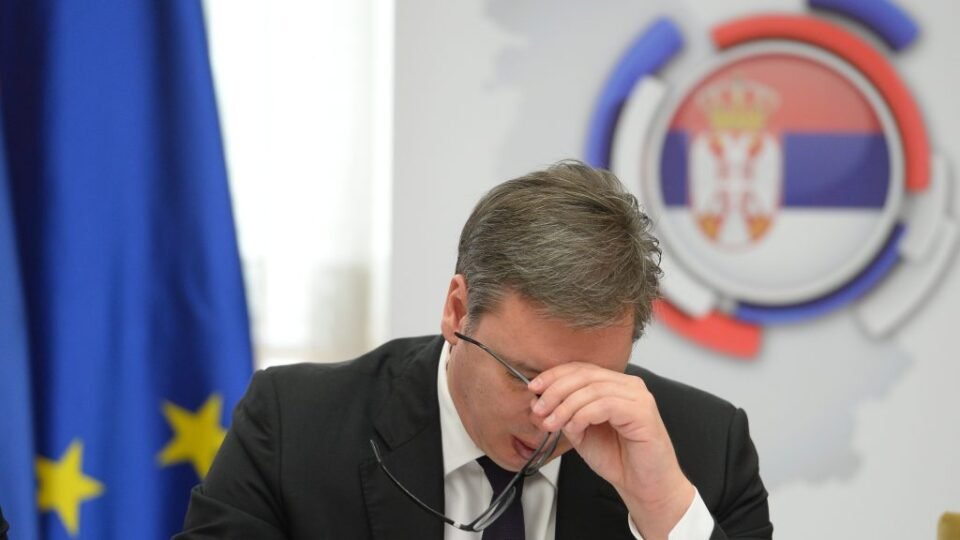
The protests have grown exponentially, with over 100,000 demonstrators gathering in Belgrade’s Slavija Square on December 22. The momentum has carried into 2024, culminating in the resignations of Prime Minister Miloš Vučević and Novi Sad’s Mayor Milan Đurić on January 28.
Despite these victories, the movement remains in an uneasy standoff with the government, which has resorted to repression, intimidation, and nationalist rhetoric to weaken dissent.
Resistance Spreads Beyond the Capital
What began as a university-led movement has now evolved into a nationwide resistance against Vučić’s Serbian Progressive Party (SNS). Protesters have mobilized in cities and towns across the country, signaling a broad-based demand for change.
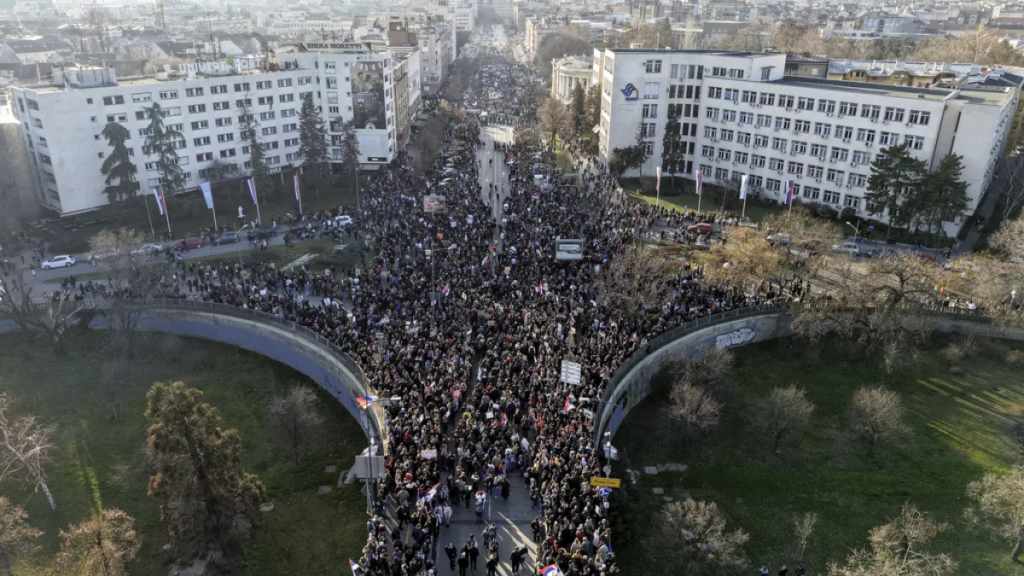
Novi Sad’s history as a site of past atrocities—ranging from the genocidal Hungarian campaign during World War II to NATO’s 1999 bombings—has fueled a collective sense of urgency among protesters. However, unlike past conflicts driven by foreign intervention, this crisis is entirely homegrown. It has exposed the government’s failures in infrastructure management, economic policy, and human rights protections. The Serbian Orthodox Church initially condemned the protests, accusing students of promoting an “anti-Serbian, anti-Christian” agenda. However, following public backlash, the church walked back its statement, revealing internal fractures over the movement. Meanwhile, violent clashes have erupted between protesters and SNS supporters, including a brutal attack on student activists in Novi Sad. Shockingly, pro-government voices have openly justified violence against protesters, with one SNS supporter from Jagodina stating he would condone attacks on his own daughter if she were demonstrating.
These events illustrate the depth of Serbia’s political divide and the lengths to which the ruling party will go to preserve its grip on power.
Vučić’s Crony Capitalism and the Global Influence Game
The crisis in Serbia is not merely about domestic corruption but also about the global economic forces shaping the country’s future. Vučić has carefully cultivated relationships with international business elites, leveraging foreign investments to consolidate power.
One of the most controversial examples is the deal between Donald Trump’s family and Serbian real estate developers to construct a luxury Trump-branded hotel on the site of the former Yugoslav Ministry of Defense in Belgrade—a site bombed by NATO in 1999. Brokered through Abu Dhabi-based financiers, the project exemplifies how Serbia’s political elite have transformed sites of national trauma into opportunities for private gain.
More broadly, the Serbian government’s partnerships with Chinese corporations have fueled unease. The Novi Sad railway station’s construction—one of many Chinese-funded infrastructure projects in Serbia—has sparked debates over foreign influence, economic dependency, and the risks of opaque contract agreements. While anti-Chinese sentiment has not become a dominant theme, there are growing concerns that Serbia’s leadership prioritizes multinational interests over public welfare.
The student movement, by contrast, presents a radically different vision—one in which economic resources serve the people rather than corporate and political elites. Their calls for increased education funding, institutional accountability, and independent judicial oversight strike at the core of Serbia’s crony-capitalist structure.
A Broader Struggle Against Neoliberalism and State Capture
Western media narratives have often misrepresented the Serbian protests, framing them as anti-Russian or pro-European Union uprisings similar to Ukraine’s Maidan movement. However, this portrayal ignores the deeper structural issues at play.
At its core, the Serbian student movement is not about aligning the country with Western or Eastern powers but about reclaiming democratic governance from a corrupt elite. Their demands reflect a broader global crisis in which governments increasingly serve the interests of multinational corporations and oligarchs rather than ordinary citizens.
This crisis is not unique to Serbia. Across the world, from Latin America to Eastern Europe, citizens are challenging state capture, economic exploitation, and democratic backsliding. Political scientist Florian Bieber has argued that Serbian opposition parties should lead the movement, but this perspective underestimates the deeper disillusionment with electoral politics itself.
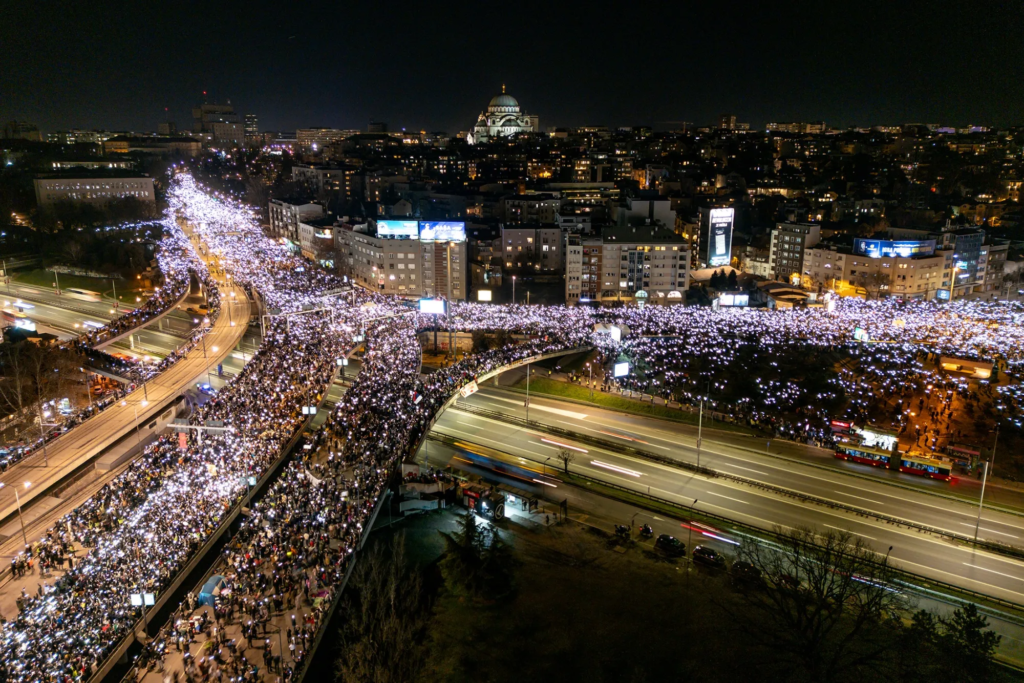
The protests go beyond party politics, representing a more fundamental struggle over the role of the state in serving its people.
Inspired by the concept of “dual power” articulated by theorist Fredric Jameson, students have not only protested but also created self-sustaining alternatives—organizing soup kitchens, mutual aid networks, and legal defense teams. Their actions demonstrate a model for grassroots governance that operates independently of state institutions.
Can the Movement Succeed?
Serbia has a long history of student-led resistance movements. In 1968, student protests secured policy concessions from Yugoslav leader Josip Broz Tito. In 2000, the student-led Otpor! movement played a key role in toppling President Slobodan Milošević. More recently, mass protests against Vučić’s support for the British mining corporation Rio Tinto forced the government to cancel a controversial lithium extraction deal.
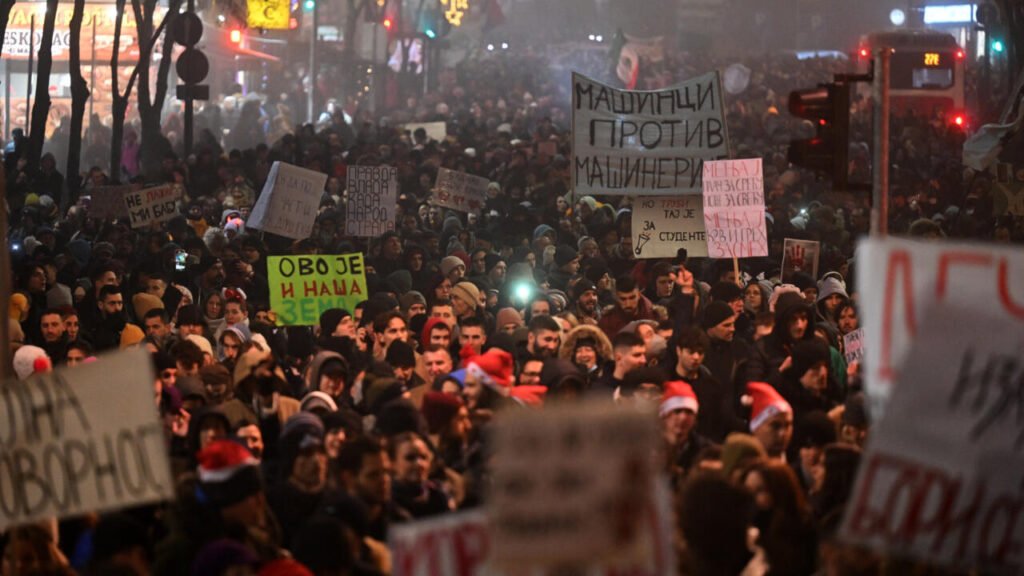
These historical precedents show that sustained pressure can yield results. However, the current movement faces significant challenges:
- Government Repression – As SNS supporters escalate violence against protesters, state-backed crackdowns could intensify.
- Co-Optation and Division – Vučić may attempt to negotiate symbolic reforms while maintaining the core structures of crony capitalism.
- Sustaining Momentum – Maintaining public engagement beyond immediate demands will be crucial for lasting systemic change.
If the movement succeeds, it could mark the beginning of a democratic renewal in Serbia, where political power is reclaimed by ordinary people rather than oligarchic elites. If it fails, it will serve as yet another cautionary tale about the dangers of unchecked political and corporate power.
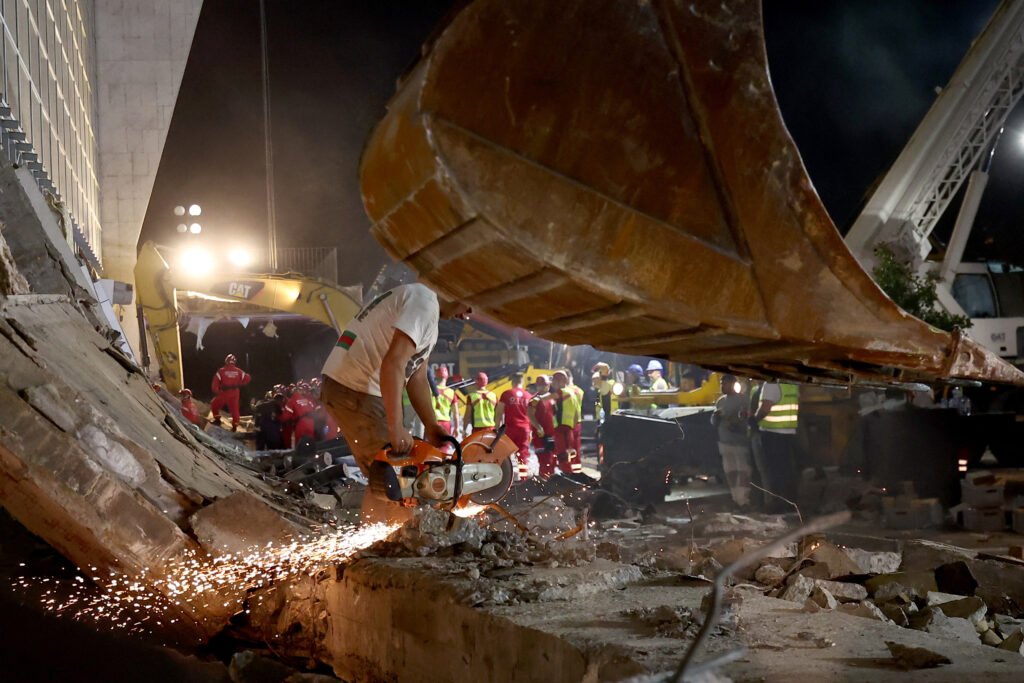
The collapse of the Novi Sad train station was more than an isolated tragedy—it was a breaking point in a nation long weighed down by corruption, economic exploitation, and authoritarian rule. Serbia’s students have now taken the lead in demanding justice, not only for those killed in the disaster but for all citizens suffering under a failing system.
The battle unfolding in Serbia is not just about infrastructure failures or political resignations; it is about the fundamental question of who the state serves. Whether this movement results in real change remains uncertain, but one thing is clear: the fight for a just and accountable Serbia has only just begun.

